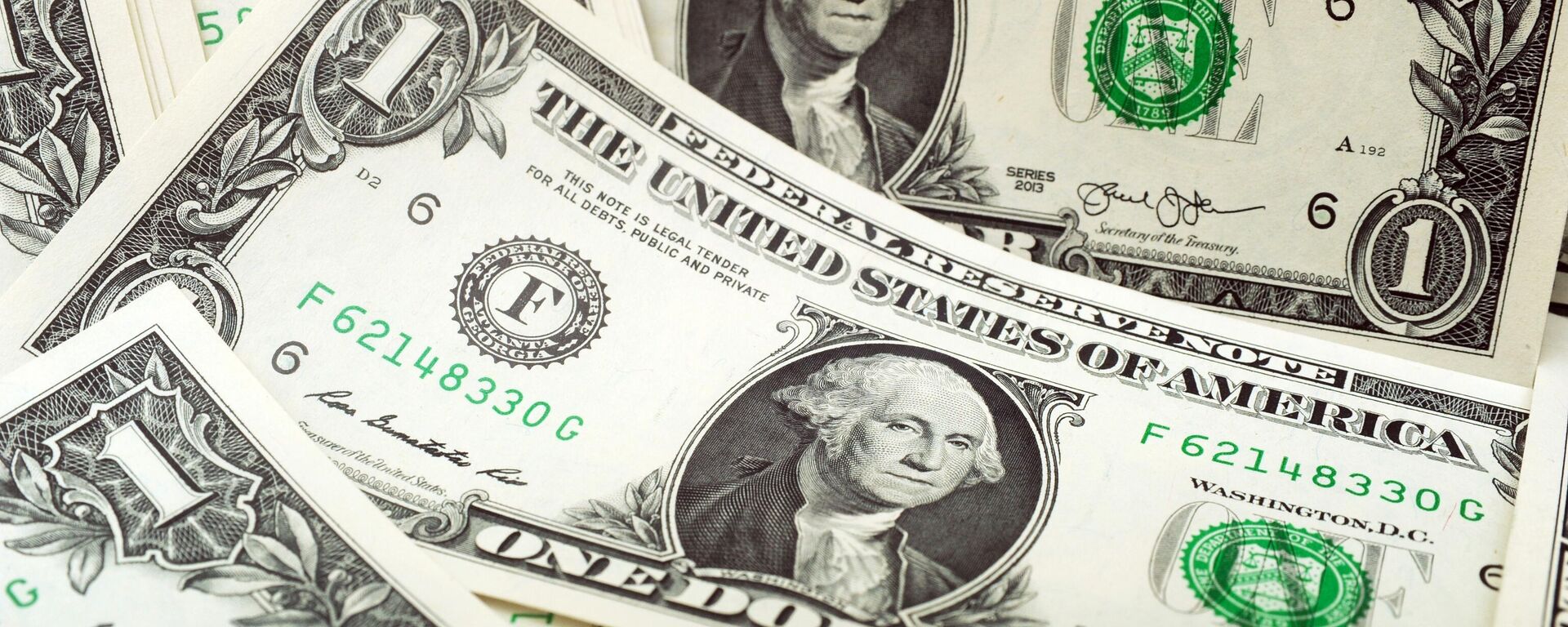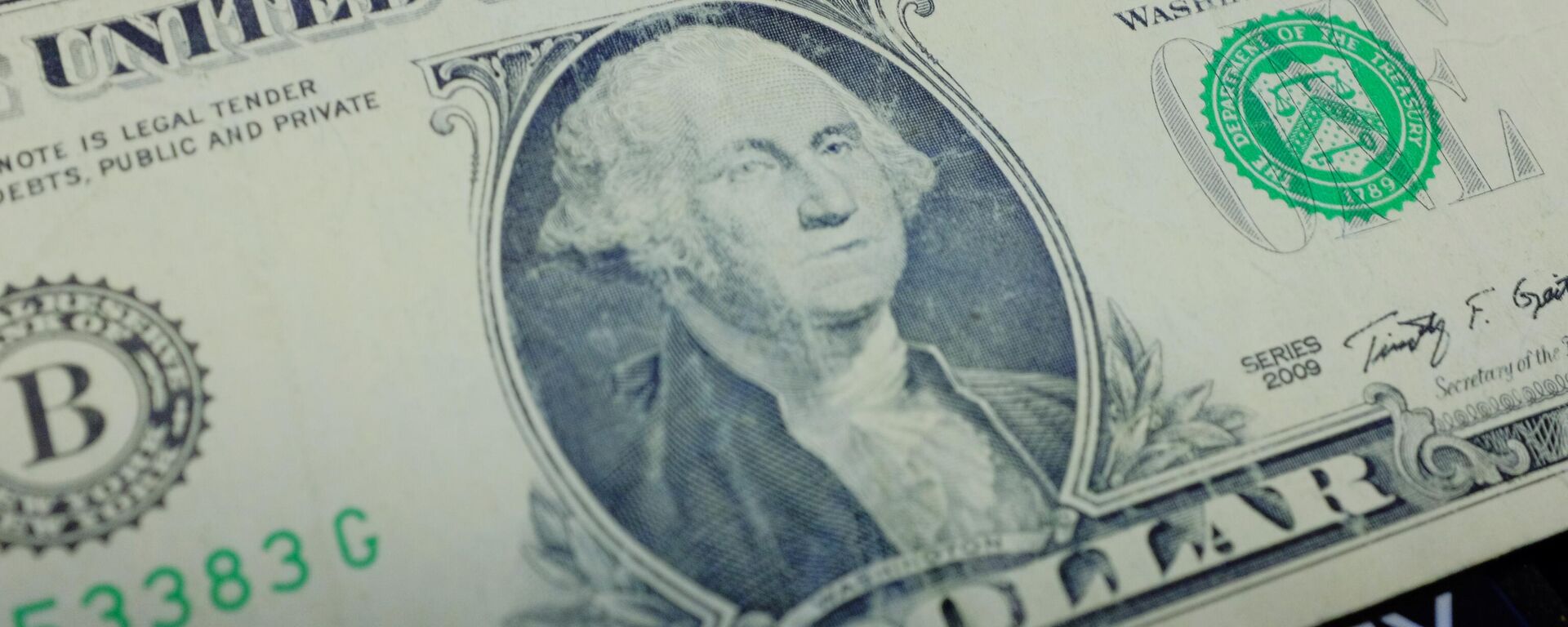https://sputnikglobe.com/20230702/jim-rogers-de-dollarization-fuelled-by-soaring-us-debt-1111626237.html
Jim Rogers: De-Dollarization Fuelled by Soaring US Debt
Jim Rogers: De-Dollarization Fuelled by Soaring US Debt
Sputnik International
The US is the largest debtor nation in the history of the world, renowned US investor Jim Rogers told Sputnik's New Rules podcast, warning that money-printing bonanza cannot last forever.
2023-07-02T17:54+0000
2023-07-02T17:54+0000
2023-07-02T18:22+0000
jim rogers
joe biden
brics
international monetary fund
opinion
us
janet yellen
dollar
dollar hegemony
yuan
https://cdn1.img.sputnikglobe.com/img/07e6/07/0c/1097212515_0:0:3087:1737_1920x0_80_0_0_f916e54493ac7e3562c796d84c594623.jpg
The US president declared on Wednesday in a Chicago speech that "Bidenomics is working." Per Joe Biden, his economic policies have prevented the nation from sliding into recession, driven the strongest recovery among the developed economies, and managed to tame inflation. Nonetheless, just 34% of Americans believe that the country's economy is in good shape, according to NORC Center for Public Affairs Research.One needs to be cautious when listening to politicians taking credit for taming inflation and saving the day, according to Jim Rogers, a legendary American investor.The crux of the matter is that the US is the largest debtor nation in the history of the world, said the investor. Indeed, the US national debt has reached over $32.3 trillion, or $96,702 for every single person in the country.Even though DC policymakers are insisting that the US economy is too big and too important to default, and so technologically advanced that it could keep growing despite soaring debt, the reality could be harsher than they dare imagine, as per the investor.To illustrate his point, Rogers referred to the 1980s, when inflation was similarly bad. Then Federal Reserve Chair Paul A. Volcker resorted to sharp interest rate hikes that exceeded 19% by January 1981. It worked at the time. However, in 1983, the United States was still a creditor nation, Rogers pointed out.Biggest Flaw of 'Bidenomics'Meanwhile, the epitome of "Bidenomics" has been increased spending, both in terms of infrastructure, healthcare, and military budget. One might wonder how sustainable these increased spending plans are.The US will not run out of money because they can always print as much as they want, the economist explained. The US will bail itself out or the International Monetary Fund (IMF) will come in and lend them some more money, too. However, as a result of these financial maneuvers, "the value of the money will deteriorate and decline as they print and borrow more and more money."Rogers referred to the British Empire's history, citing the fact that in the 1920s, it was the richest, most powerful country in the world, second to none. Still, 50 years later Britain was literally bankrupt so that the IMF had to fly to London and bail them out.What Yellen Doesn't Say About De-DollarizationOne shouldn't shrug off the unfolding de-dollarization trend as something inconsistent given the US skyrocketing debt and recession risks, according to the investor.Treasury Secretary Janet Yellen suggested that currently, there isn't a viable replacement for the dollar when it comes to trade, investments, or reserve currency. "There is a very good reason why the dollar is used widely in trade, and that's because we have deep, liquid, open capital markets, rule of law and long and deep financial instruments," she told the press earlier this week while commenting on BRICS questioning the greenback's dominance.BRICS – an acronym for the major developing economies Brazil, Russia, India, China, and South Africa – has been considering an alternative to the US dollar, and is expected to discuss the matter at the 15th summit which will take place from August 22 to 24 in Johannesburg, South Africa.As of yet, however, there is no currency that could completely replace the greenback, according to Rogers, who sees some potential in the Chinese yuan.Don't Listen to 'Some Guy on TV' While Bracing for CrisisThe investor does not rule out that the US is about to find itself in a heap of trouble while the nation's government does not have effective tools to fix the economy. "In 2008, we had a big problem because of too much debt. Since 2009, the debt everywhere has skyrocketed. So the next financial problem has to be very, very serious because the debt is so much bigger," he warned.When asked what Americans could do in order to protect themselves in the event of an upcoming recession, the economist noted that they shouldn't "listen to some guy on the Internet or the TV," but put their money into things that they themselves understand and know about.At the same time, the investor urged everyone to keep his/her debt as low as possible."Borrowing money has never been a big way to solve those problems," Rogers continued. "So I would urge everybody to just keep their debt as low as possible, whatever they do with their money or whatever they do with their assets, stay away from people who have big debts, if you can. You really know who has debt and who doesn't, avoid the people who have the big debts and the countries that have big debts and keep your money in things you know about, and don't go deep into debt until the crisis ends."Likewise, one should know one's onions if one wants to get started as an investor and succeed under the current circumstances, per the economic expert.For more of Jim Rogers' exclusive analysis on the ticking US debt time bomb, check out the full episode of the New Rules podcast.
https://sputnikglobe.com/20230630/bidenomics-alternative-to-trickle-down-economy-or-a-war-on-the-poor-1111581640.html
https://sputnikglobe.com/20230616/growth-of-brics-could-accelerate-de-dollarization-1111210989.html
https://sputnikglobe.com/20230619/brics-expansion-goes-hand-in-hand-with-de-dollarization-and-decline-of-us-empire-1111301250.html
Sputnik International
feedback@sputniknews.com
+74956456601
MIA „Rossiya Segodnya“
2023
News
en_EN
Sputnik International
feedback@sputniknews.com
+74956456601
MIA „Rossiya Segodnya“
Sputnik International
feedback@sputniknews.com
+74956456601
MIA „Rossiya Segodnya“
jim rogers, bidenomics, joe biden economic policies, joe biden spending spree, green new deal, us debt ceiling agreement, us military spending, us recession, us inflation, us national debt, us money-printing, devaluation of the us dollar, dedollarization
jim rogers, bidenomics, joe biden economic policies, joe biden spending spree, green new deal, us debt ceiling agreement, us military spending, us recession, us inflation, us national debt, us money-printing, devaluation of the us dollar, dedollarization
Jim Rogers: De-Dollarization Fuelled by Soaring US Debt
17:54 GMT 02.07.2023 (Updated: 18:22 GMT 02.07.2023) The US is the largest debtor nation in the history of the world, renowned US investor Jim Rogers told Sputnik's New Rules podcast, warning that the money-printing bonanza cannot last forever.
The US president declared on Wednesday in a Chicago speech that "Bidenomics is working." Per Joe Biden, his economic policies have prevented the nation from sliding into recession, driven the strongest recovery among the developed economies, and managed to tame inflation. Nonetheless, just 34% of Americans believe that the country's
economy is in good shape, according to NORC Center for Public Affairs Research.
One needs to be cautious when listening to politicians taking credit for taming inflation and saving the day, according to Jim Rogers, a legendary American investor.
"I would concur that the worst is yet to come," Rogers told Sputnik. "It always comes later after normal fluctuations and corrections. I do not agree with the White House that everything is okay now, and I certainly don't agree that they should take credit for it. To look back at previous inflation anywhere in the world, you will see it goes up, down, up, down. This is the way markets work."
The crux of the matter is that the US is the largest debtor nation in the history of the world, said the investor. Indeed, the US national debt has reached over $32.3 trillion, or $96,702 for every single person in the country.
"Every nation in history that has gotten into that kind of situation has wound up having problems," Rogers explained. "We have printed a lot of money, we have borrowed and spent a lot of money, which is wonderful for the short term, but eventually we have to pay the price. Inflation is going to get worse. The debt problems are going to get worse, and the US is going to suffer. This is not a good time to be a young American. I'm an old American. It's a good time to be an old American because I don't have to pay the debt. But my kids are going to have to pay the debt and they will have a lot of problems."
Even though DC policymakers are insisting that the US economy is too big and too important to default, and so technologically advanced that it could keep growing despite soaring debt, the reality could be harsher than they dare imagine, as per the investor.
To illustrate his point, Rogers referred to the 1980s, when inflation was similarly bad. Then Federal Reserve Chair Paul A. Volcker resorted to sharp interest rate hikes that exceeded 19% by January 1981. It worked at the time. However, in 1983, the United States was still a creditor nation, Rogers pointed out.
"The inflation now is worse," the investor said. "Now the United States is the largest debtor nation in the history of the world. So, sure, things are okay at the moment, but 'at the moment' is not going to last forever. Somebody has got to pay this debt. Somebody has to print more money. Somebody has to borrow more money. And when you borrow huge amounts of money, interest rates will go higher and higher, inflation will go higher because so much money has been printed."
Biggest Flaw of 'Bidenomics'
Meanwhile, the epitome of "Bidenomics" has been increased spending, both in terms of infrastructure, healthcare, and military budget. One might wonder how sustainable these increased spending plans are.
"They have spent a lot of money buying votes," Rogers responded. "That's what people in Washington have done very well over the past few decades. They've learned how to do it. Is it sustainable? Of course not. I mean, unless you or somebody else is going to lend them huge amounts of money at ever lower interest rates, which has never happened, of course it's not sustainable."
The US will not run out of money because they can always print as much as they want, the economist explained. The US
will bail itself out or the International Monetary Fund (IMF) will come in and lend them some more money, too. However, as a result of these financial maneuvers, "the value of the money will deteriorate and decline as they print and borrow more and more money."
"The value of
the US dollar will lose more and more value as it prints more. It always happens this way," the investor stressed.
Rogers referred to the British Empire's history, citing the fact that in the 1920s, it was the richest, most powerful country in the world, second to none. Still, 50 years later Britain was literally bankrupt so that the IMF had to fly to London and bail them out.
"That will happen to the US," warned Rogers. "Not this year. Don't worry. It won't happen this year, but it will happen."
What Yellen Doesn't Say About De-Dollarization
One shouldn't shrug off
the unfolding de-dollarization trend as something inconsistent given the US skyrocketing debt and recession risks, according to the investor.
Treasury Secretary Janet Yellen suggested that currently, there isn't a viable replacement for the dollar when it comes to trade, investments, or reserve currency. "There is a very good reason why the dollar is used widely in trade, and that's because we have deep, liquid, open capital markets, rule of law and long and deep financial instruments," she told the press earlier this week while commenting on BRICS questioning the greenback's dominance.
"Everything [Yellen] said is true, and that's the reason the US got to this position," Rogers said. "But now, what she left out, they are the largest debtor in history and the debt is skyrocketing and the money printing is skyrocketing. Eventually we have to pay the price. Every country in history has had to pay the price. Yes, she will print huge amounts of money. She will borrow and spend huge amounts of money, and they will think they are okay for a while, just as they have for other countries in the past. But, unless something has changed in world history and in world economics, this will not go on forever."
BRICS – an acronym for the major developing economies Brazil, Russia, India, China, and South Africa – has been considering an alternative to the US dollar, and is expected to discuss the matter at the 15th summit which will take place from August 22 to 24 in Johannesburg, South Africa.
As of yet, however, there is no currency that could completely replace the greenback, according to Rogers, who sees some potential in the Chinese yuan.
"I don't see anything on the horizon yet," the investor said. "And that may cause a big problem if and when things really go wrong with the US and with the US dollar, the world will have a serious financial crisis for a while anyway, unless we can bond something else."
Don't Listen to 'Some Guy on TV' While Bracing for Crisis
The investor does not rule out that the US is about to find itself in a heap of trouble while the nation's government does not have effective tools to fix the economy. "In 2008, we had a big problem because of too much debt. Since 2009, the debt everywhere has skyrocketed. So the next financial problem has to be very, very serious because the debt is so much bigger," he warned.
When asked what Americans could do in order to protect themselves in the event of an upcoming recession, the economist noted that they shouldn't "listen to some guy on the Internet or the TV," but put their money into things that they themselves understand and know about.
"It is extremely important, especially when a crisis comes, that you have your money in place that you yourself understand a lot about," Rogers said. "And if that's just your own local currency and your own local bank, fine, do it. You'll survive the gigantic problems that are coming (…) We've had economic crises throughout history. We'll have them again. The way they prepare is to stay with what you yourself know."
At the same time, the investor urged everyone to keep his/her debt as low as possible.
"Borrowing money has never been a big way to solve those problems," Rogers continued. "So I would urge everybody to just keep their debt as low as possible, whatever they do with their money or whatever they do with their assets, stay away from people who have big debts, if you can. You really know who has debt and who doesn't, avoid the people who have the big debts and the countries that have big debts and keep your money in things you know about, and don't go deep into debt until the crisis ends."
Likewise, one should know one's onions if one wants to get started as an investor and succeed under the current circumstances, per the economic expert.
"Don't listen to hot tips on the Internet or TV or something like that. Everybody listening to this knows a lot about something, whether it's cars or technology or fashion. Stay with what you know. You will find it. You will find things that are going to change long before I will, because that's what you do every day. And when you see something changing that you know will work, do some research and invest and you will become successful. Don't listen to hot tips. Don't listen to the Internet. Don't listen to the TV. Stay with what you know. And if people tell you that's boring, be boring," the legendary investor concluded.
For more of Jim Rogers' exclusive analysis on the ticking US debt time bomb, check out the full episode of the New Rules podcast. 




